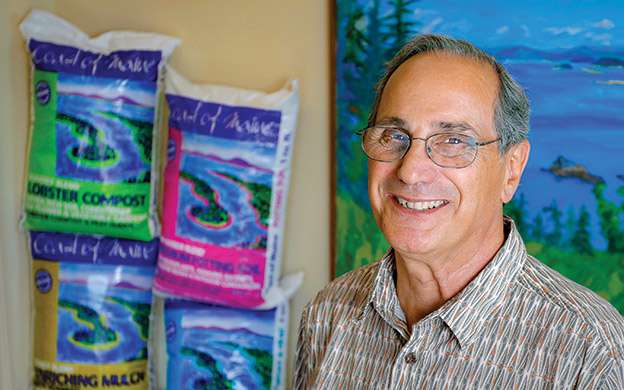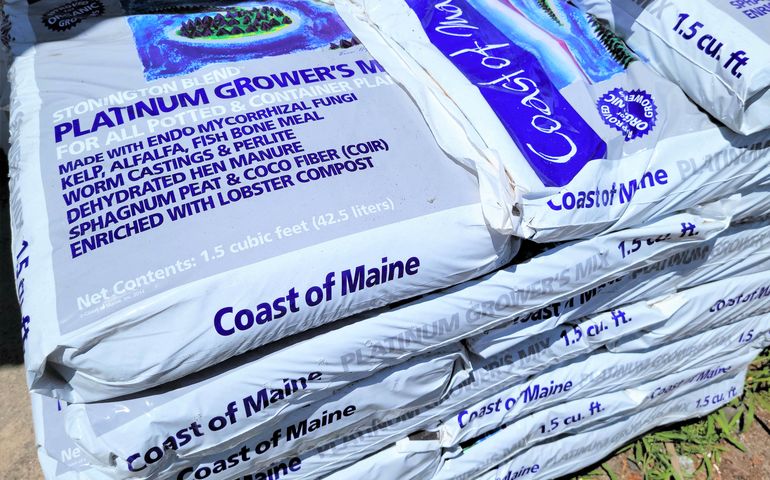
The dirt difference: Cannabis grower plants roots, literally, in Maine soil
 Photo / William Hall
Coast of Maine Organic Products, based in Portland and East Machias, markets its Stonington Blend of soil specifically for the cannabis industry. These bags were for sale at A2Z Grow Supplies in Brunswick.
Photo / William Hall
Coast of Maine Organic Products, based in Portland and East Machias, markets its Stonington Blend of soil specifically for the cannabis industry. These bags were for sale at A2Z Grow Supplies in Brunswick.
With the nation’s cannabis industry growing like a weed, businesses and consumers are taking more interest in the soil where weed grows — and that includes soil from Maine.
A Massachusetts cannabis farm, Coastal Cultivars, last week announced it will source soil from Coast of Maine Organic Products, a Portland company that began 26 years ago composting marine waste such as lobster scraps into high-end gardening products.
The grower plans to use Coast of Maine’s Stonington Blend of organic soil as the “primary medium” for producing Coastal Cultivars’ No. 9 Sunflower Collection of cannabis products. A press release from the company, which began in 2020 and now operates a 14-acre farm in Wareham, Mass., heavily touted the products’ Maine roots.
Increasingly, it seems, cannabis customers are digging the dirt.
“Massachusetts consumers tend to be more educated than other legalized states and want to know what they're putting in their body is a sustainably sourced product,” Coastal Cultivars’ owner, Krishna Ghandi, told Mainebiz.
“By using natural soils, not only are we able to produce a higher-quality finished cannabis product, but we can also do so in the most environmentally friendly way possible.”
The deal with Coast of Maine is an informal partnership, spokesman Cameron Bonsey told Mainebiz. But Coastal Cultivars has recently purchased nearly 20,000 cubic feet of the soil, he said, with more orders to come.
For Coast of Maine, cannabis growers now represent about 10% of sales, which total around $35 million annually.
That kind of business is a far cry from a decade ago, when Bonsey and other Coast of Maine employees would test various formulations of organic soil with marijuana growers, sometimes on the down-low.
Although Maine has permitted marijuana for medical use since 1999, recreational-use cannabis wasn’t legalized until 2016. In the meantime, Coast of Maine knew its soil and other products were becoming popular with pot purveyors, and sought their input.
“Cannabis growers are very informed, very knowledgeable about each plant,” Bonsey said. “They’re the ones who did the testing.”

Coast of Maine launched its Stonington product line around the time recreational cannabis became legal, and specifically for that market. The name not only refers to a coastal Maine town, but is a tongue-in-cheek reference to marijuana enthusiasts, Bonsey said.
Since then, the line has grown. Coast of Maine, which operates a production facility in East Machias in addition to its Portland office, even plans to expand Stonington next year with the addition of a hydroponic (soilless) growing product.
Other companies are taking interest in such products. Perhaps the most dramatic example is lawn-and-garden giant Scotts Miracle-Gro Co. (NYSE: SMG), which launched a cannabis care subsidiary, Hawthorne Gardening Co., a decade ago.
Last year, Hawthorne generated nearly 30%, or $1.4 billion, of Scotts’ overall sales, up from 25% in 2020 and 20% in 2019. In 2021, Scotts also invested $150 million in a Toronto-based cannabis acquisition company.
Back in Maine, the company where Bonsey has worked for 15 years isn’t the only one buoyed by the marijuana industry’s interest in soil. Across the state, growers promote their Maine-grown products and the state’s earthen resources. An Eliot company, Sweet Dirt, even advertises itself with the tagline “the finest flower from the sweetest soil.”
Bonsey sees the interest in Maine soil as similar to the evolution of another big business in the state.
“It’s like the craft beer industry,” he said. When it comes to raw materials and cultivation sources, “there are so many different things you can drill down on.”










0 Comments